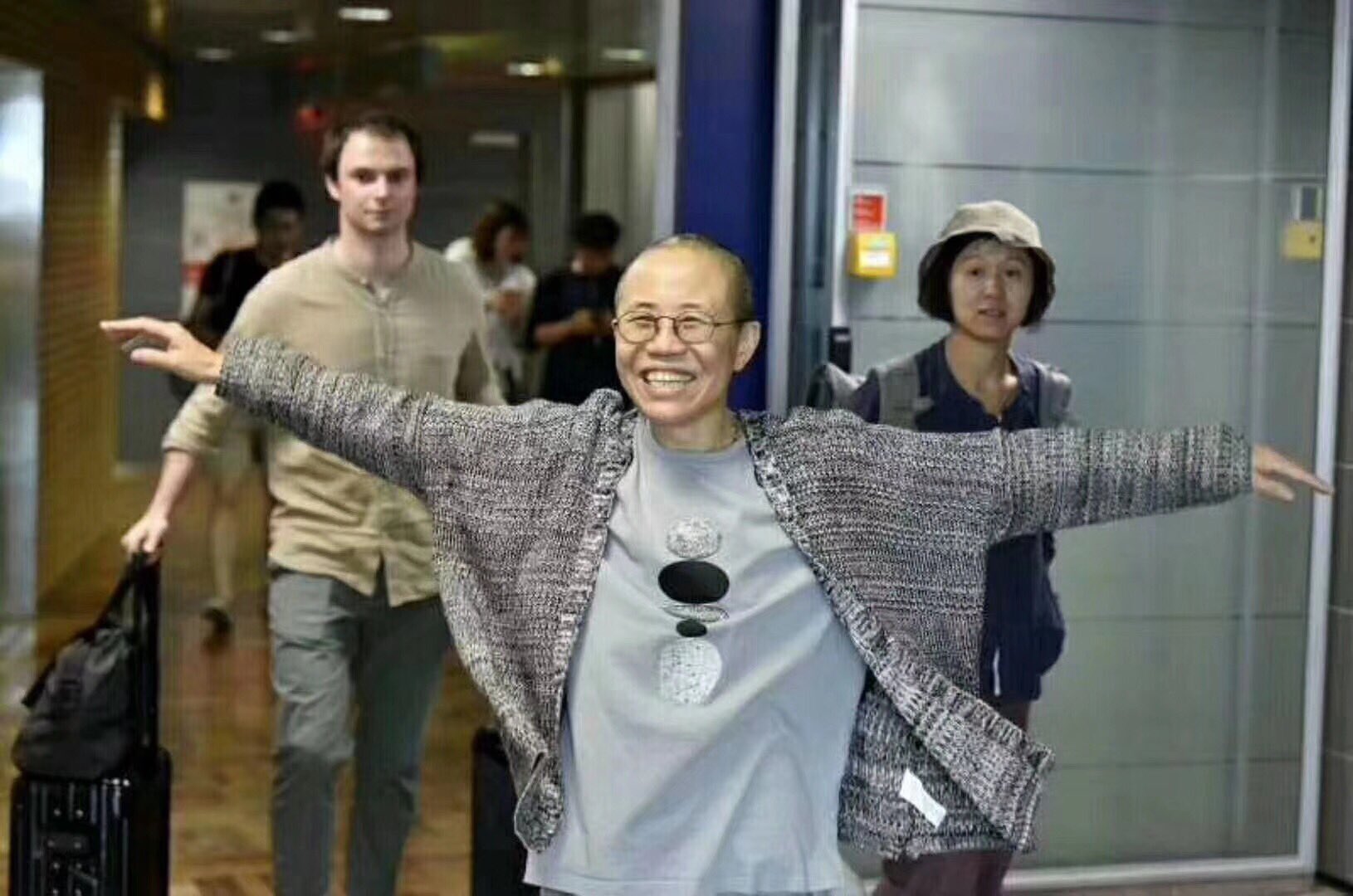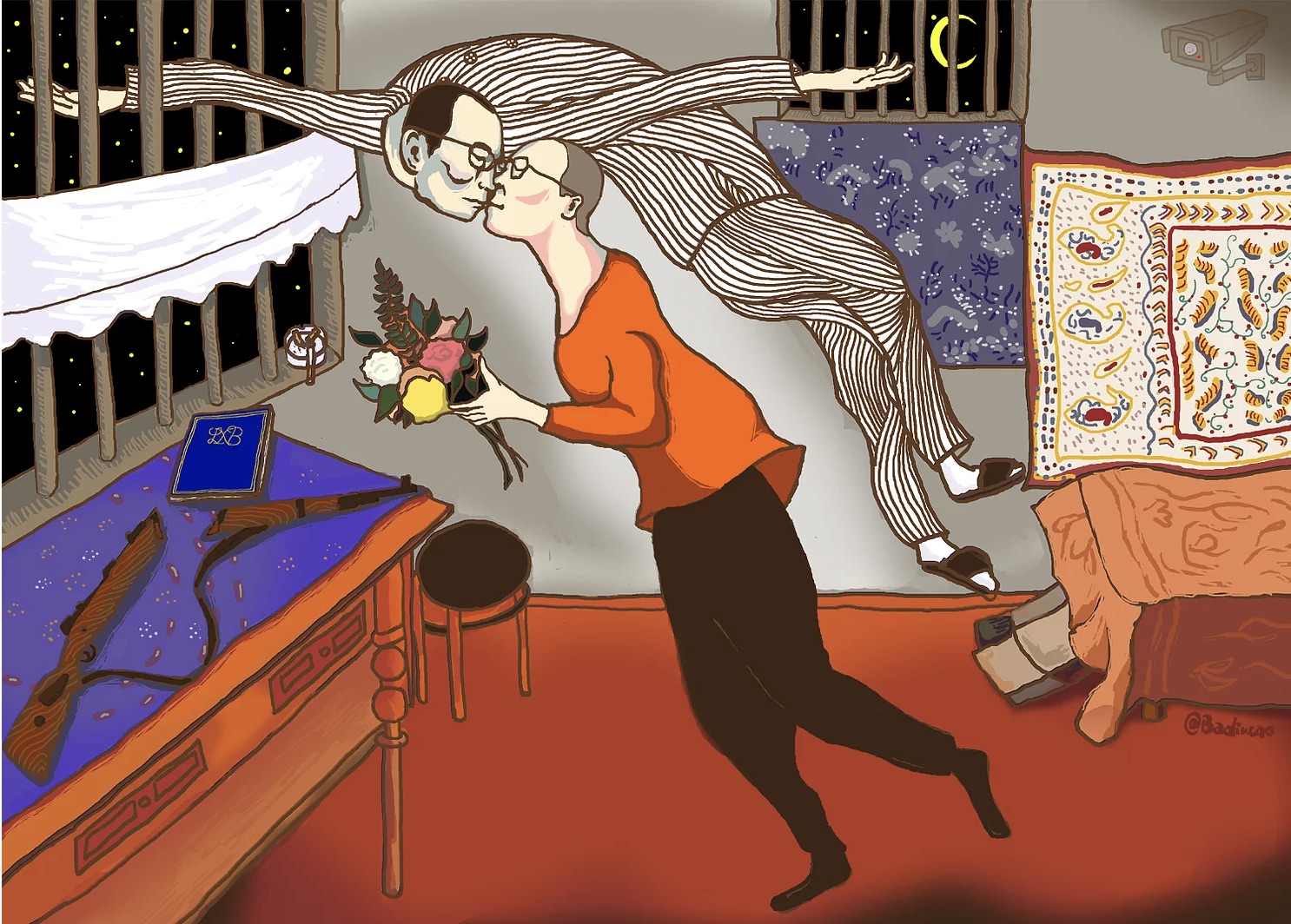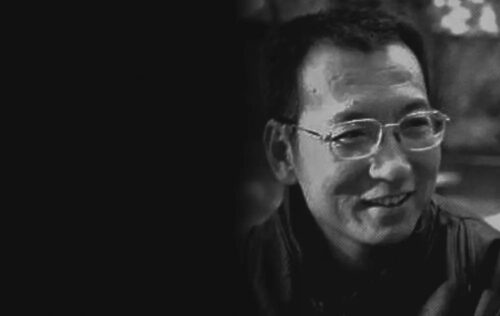Liu Xia is free

Eight years after being placed under de facto house arrest despite committing no crime, Liu Xia 刘霞 — the widow of 2010 Nobel Peace Prize laureate Liu Xiaobo 刘晓波 — left China on Tuesday morning, boarding an 11 am Finnair flight from Beijing for Berlin. Her plane transited in Helsinki, where the above photo was snapped by AFP.
China’s Ministry of Foreign Affairs spokesperson Hua Chunying, at a regular briefing, said Liu Xia left “in accordance to her own will” for “medical treatment.” Her departure came one day after German Chancellor Angela Merkel met Chinese premier Li Keqiang in Berlin. Some have speculated that Merkel pushed for Liu’s release when she visited Beijing in May, where she met the wives of two detained Chinese lawyers.
Hua denied any connection between Li Keqiang’s trip and Liu’s release.
Liu Xia, a “soft-spoken, chain-smoking 57-year-old poet” — as the AP puts it — was championed by politicians, artists, and activists alike, including organizations such as Amnesty International and PEN America. Germany and the U.S. both offered her asylum and called for her release this April.
Liu, as has been noted multiple times, is guilty of only having fallen in love with Liu Xiaobo, who she married in 1996. Liu Xiaobo was arrested on June 23, 2009 and later sentenced to 11 years in jail on the charge of “inciting subversion of state power,” a catch-all used to punish many activists. Liu Xiaobo was guilty of drafting the Charter 08 manifesto (read in full), which calls for democracy, freedom of expression, and human rights in China. Amnesty International called Liu’s punishment the harshest out of 35 subversion cases since 2003.
Liu Xiaobo was awarded the Nobel Peace Prize on October 8, 2010. Liu Xia traveled from Beijing to his prison in Liaoning Province to inform him of the news, and shortly upon her return was placed under house arrest. (The Global Times, in an editorial published today, says Liu Xia was “definitely not under house arrest,” and continues: “As the widow of the most widely known dissident in China, Liu Xia appears to have no interest in being a typical dissident herself. Certain Western forces must exercise restraint and stop taking advantage of her.”)
Liu Xiaobo died of liver cancer on July 13, 2017, with his wife by his side. Among his final words to her from his Shenyang, Liaoning hospital bed, in a handwritten note, were: “Love as intense as ice, love as remote as blackness…My praise is perhaps an unforgivable poison.” (Some have speculated that authorities let Liu Xia leave in order to avoid a “surge” of negative publicity on the anniversary of her husband’s death.)
Liu Xia was allowed to scatter her husband’s ashes off the coast of Dalian on July 16, 2017, which marked — until today — one of the last times she was seen in public.
Calls for Liu Xia’s release intensified last December after it was revealed that she was suffering from severe depression. Chinese dissident and author Liao Yiwu posted to Facebook one of Liu’s poems on December 9: “Too solitary / I have not the right to speech / To speak loudly / I live like a plant / I lie like a corpse.”
“I can’t leave here, and I’m so lonely I think I’m going crazy,” Liu wrote to Nobel Prize-winning author Herta Mueller.
On April 30 of this year, Liao Yiwu says he spoke to Liu Xia at her home, where she said, “Now, I’ve got nothing to be afraid of. If I can’t leave, I’ll die in my home. It’s easier to die than live. Using death to defy could not be any simpler for me.”
Hong Kong Free Press has a roundup of reactions from NGOs and activists. While all expressed relief for Liu Xia, there is concern for her family, notably her brother Liu Hui, who was sentenced to 11 years for fraud in 2013, possibly as retribution for Liu Xiaobo’s Nobel award. While Liu Hui has since been released, he remains closely monitored.
OTHER NOTES
AFP’s Rebecca Davis has an excellent series of tweets you should follow:
Against all odds, I actually was able to enter Liu Xia's apartment yesterday and see her, hold her hand. No indication from her that she thought she was leaving, let alone so soon. Blows my mind that today she is now free. Story forthcoming w @pakwayne
— Rebecca Davis (@rebeccaludavis) July 10, 2018
Asked why Liu Xia was able to leave now, or if China placed any conditions on her in exchange for her freedom, MOFA said: "China’s border exit and entry department managed the matter in accordance to law. This is not a diplomatic question and I have no more info for you."
— Rebecca Davis (@rebeccaludavis) July 10, 2018
MOFA's Hua Chunying also scolded HK media for asking so many qs on Liu Xia. "I think your colleagues from HK are especially interested in this issue. Why are you so interested in this issue? I believe there are far more areas or issues for you to follow on.” @joannachiu
— Rebecca Davis (@rebeccaludavis) July 10, 2018
Foreign affairs spokesperson Hua Chunying did not seem pleased by all the questions about Liu Xia:
Foreign ministry spokeswoman Hua Chunying singled out Hong Kong reporters for asking about #LiuXia. "I think your colleagues from Hong Kong are especially interested in this issue. Why are you so interested? I believe there are far more areas for you to follow." pic.twitter.com/t843Ke5eGb
— Joanna Chiu (@joannachiu) July 10, 2018
Washington Post: “She will start a new life and is grateful for all the people who have cared for her and helped her,” her brother Liu Hui posted on WeChat on Tuesday morning.
Devotion amid despair: the great contemporary love story of Liu Xia and Liu Xiaobo — an excellent story from the Guardian last year written by Tom Phillips and Tania Branigan.
“In a way Xiaobo chose his life and … has been living exactly as he thought he should,” said Jean-Philippe Béja, an academic and friend of 25 years. “But for his wife, for his friends, for his family, it is different.
“Xiaobo chose his work. Liu Xia chose Xiaobo. And they have taken revenge on her, which is absolutely terrible.”
(Personal note / disclosure: I wrote a poem about Liu Xia and performed it last October in an event headlined by the current U.S. poet laureate, Tracy K. Smith, taking inspiration from a line from Liu Xiaobo, quoted in the above Guardian piece. Liu Xiaobo wrote to his wife: “Even if I were crushed into powder, I would still use my ashes to embrace you.”)
The Margins (Asian American Writers’ Workshop) features several of Liu Xia’s poems: “Eyes will return tonight / with their ghosts / in the shape of tombstones…”
I’m just happy. Best wishes to you, Liu Xia! (Pic: Liu Xia at Helsinki airport immigration) pic.twitter.com/CAy5bweMvJ
— Yaqiu Wang 王亚秋 (@Yaqiu) July 10, 2018
And finally, check out Who is Liuxia, a series of artworks by Chinese artist Badiucao:







